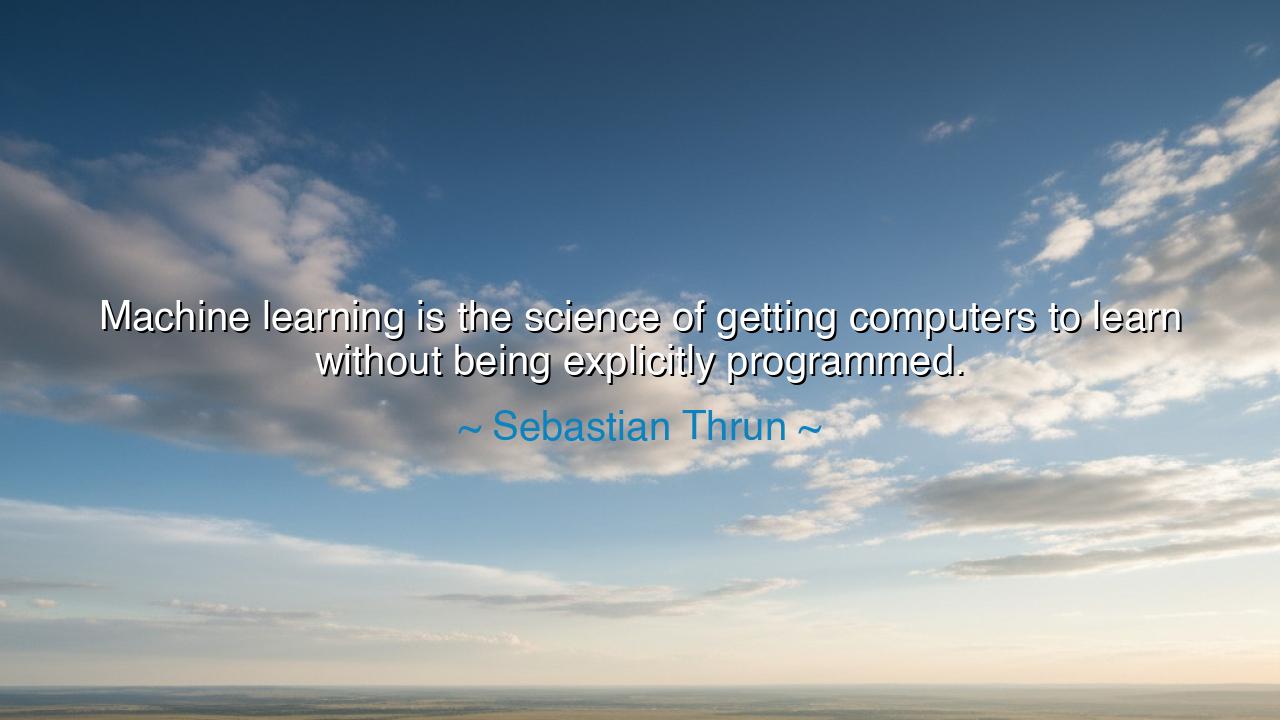
Machine learning is the science of getting computers to learn
Machine learning is the science of getting computers to learn without being explicitly programmed.






In the words of Sebastian Thrun, the visionary who helped give life to the age of intelligent machines, there lies both wonder and warning: “Machine learning is the science of getting computers to learn without being explicitly programmed.” Though these words sound technical, they carry the weight of prophecy — for they describe not only a revolution in technology but a turning point in the history of human understanding. What Thrun names is not a mere shift in computing; it is the creation of a new kind of mind — one that, like our own, learns from experience, grows from failure, and finds patterns where once there was chaos.
In the earliest days of machines, man was their absolute master. The computer, though powerful, could do only what it was commanded to do. It followed logic as the sun follows the horizon — unchanging, predictable, bound by rule and command. Every line of code was a link in a chain that bound it to human intention. But in time, the dreamers of the modern age — the seekers of pattern, the architects of intelligence — began to wonder: what if the machine could teach itself? What if, instead of being told each step, it could learn from data as a child learns from the world? Thus was born the sacred art of machine learning, a science that no longer instructs machines in what to do, but rather gives them the power to discover, adapt, and evolve.
Thrun, who led the creation of the self-driving car, became one of the high priests of this new order of thought. He saw that the old way — programming each rule by hand — could not contain the vast complexity of the world. The roads were too varied, the conditions too infinite. Only a machine that could learn from the flow of experience, that could recognize patterns in the fabric of reality, could hope to navigate it. So he and his disciples taught machines to see, to listen, to adjust — to learn. The code became not an instruction, but a seed; the machine became not a servant, but a student. And as it learned, it began to reflect back to us the deepest mystery of creation: the ability to know without being told.
Yet in this advancement there is something profoundly human. For what is learning but the essence of life itself? The infant is not born with knowledge of language or love, yet through observation and imitation, it masters both. The mind of the learner is not written with instructions; it is shaped by experience. In this way, machine learning mirrors the process by which nature shaped intelligence itself — not by command, but by evolution. The computer that learns without explicit programming stands as the mechanical echo of humanity’s own awakening. It is the continuation of the same long journey that began when the first spark of curiosity lit the mind of early man.
Consider, for a moment, the story of Alan Turing, the mathematician who laid the foundation for artificial intelligence. In the dark days of World War II, he built machines that could think faster than any human mind, deciphering the codes of the enemy and changing the fate of nations. But even Turing could only imagine the next step — that one day, a machine might teach itself, not from logic alone, but from observation and experience. His dream, once thought madness, is now the world we inhabit. Thrun’s words, then, are the fulfillment of Turing’s vision — the moment when the mechanical becomes almost alive, when the static code breathes with the pulse of adaptation.
But wisdom warns us: every gift carries its shadow. If machines can learn without being programmed, then they can also learn what we did not intend. They will mirror not only our intelligence but our flaws, our biases, our blindness. As the ancients said of fire, “It warms and it burns.” So too with this new fire of knowledge. To wield it wisely, we must pair innovation with ethics, progress with compassion. We must ensure that the intelligence we create serves not only our convenience but our conscience. The machine learns from us — therefore, we must become worthy teachers.
The lesson, then, is not only for the builders of machines but for all humankind: never cease to learn. The machine’s power to learn without instruction is the reflection of our own power to grow without limit. Just as Thrun’s computers improve through feedback and experience, so must we refine our spirits through reflection and action. Let each failure become data, each success a model to build upon. In this way, we, too, become learners — dynamic, adaptive, and ever-evolving.
And so, children of the digital dawn, remember the teaching of Sebastian Thrun: that to teach a machine to learn is to hold a mirror to our own destiny. The power we give to machines is the power we must reclaim for ourselves — the courage to think, to evolve, and to seek truth without being told. For as long as we, like our creations, continue to learn, humanity will never be static, never obsolete. We shall remain, as we have always been — the eternal students of the universe, ever learning, ever becoming.






AAdministratorAdministrator
Welcome, honored guests. Please leave a comment, we will respond soon